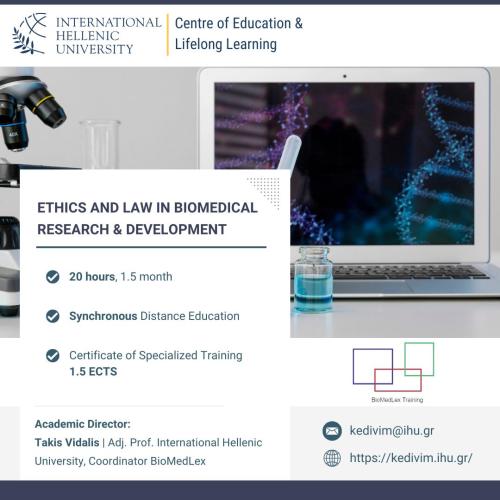10/12/2024 00:00:00 - 24/03/2025 23:59:59
Applications closed
Synchronous distance education
Certificate of Specialized Training
Short description:
Students of medical/health sciences, Law, Life sciences, philosophy studies, social sciences
Lawyers, medical doctors, health care professionals, biology scientists
ECTS: 1,5
Tuition Details:
Discount Policy
A special discount policy with a 30% discount is applied for students and graduates of the International Hellenic University, subject to approval by the Governing Committee following a substantiated recommendation by the Council (Article 2, paragraph 7 of the Internal Operating Regulations of the Lifelong Learning Center).
A special discount policy with an 80% discount is applied for employees and staff of the International Hellenic University, subject to approval by the Governing Committee following a substantiated recommendation by the Council.
A 20% discount is offered to students of other institutions and unemployed individuals.
The combination of discount policies is not permitted.
Evaluation method:
Final written examination at the conclusion of the program
Scientific director:
Nikolaos Monokrousos (IHU Associate Professor - Director of Postgraduate Studies in Bioeconomy: Biotechnology and Law )
Academic director:
Takis Vidalis (Lawyer)
Basic subject:
Social Sciences, Law and Humanities
Subject subcategories:
Legal science
Entry Requirements
Effective Communication in English.
The programme's aim
The promotion of innovative applications in Biomedicine has been governed in recent decades by a detailed framework of ethical principles and legal rules ensuring that technology is compatible with the core values of a modern society. As early as the late 1980s, this framework had already begun to take shape, with the adoption of mandatory regulations at both international and national level. Compliance by universities, research centres, hospitals and health care establishments, as well as by industry active in the fields of research and development, is now a basic prerequisite both for securing funding for their programmes from public or private sources and for making research results available to the wider research community.
On the other hand, as technology evolves, regulatory rules need to be constantly adapted to meet new realities. This leads to a continuous refinement of ethical standards and the legal provisions to address novel problems, hence the need to regularly update scientists, research sponsors, R&D unit managers and their legal departments on the basis of new data.
In Europe, particularly since 2000, there has been a marked increase in the production of ethical and legislative texts in the field of Biomedicine, with direct applications in research. The Convention on Human Rights and Biomedicine (Oviedo Convention), with its protocols on biomedical research and genetic data management, as well as a number of EU laws (in particular the Regulations on Personal Data Protection, Clinical Trials and, more recently, Artificial Intelligence) are typical examples of binding instruments, which form the basis for the adoption of more detailed national legislation in all countries. At the same time, the European courts (the Strasbourg Court of Human Rights and the EU Court of Justice) have, in important decisions, created new regulatory constants, which also have binding force. Similar developments have taken place outside Europe (US, Canada, Australia, China, Japan, etc.), with few differences in the main principles and fundamental rules to be respected.
In conclusion, the emergence of a new reality in which scientific progress and technological development must be in line with the values of a civilised society has led to what is now called 'responsible science' or 'responsible research' and is being systematically promoted at the level of the international community.
Educational objectives
The main learning objective of the seminar is to enable trainees to meet the requirements of the regulatory framework for modern applications of research and development in Biomedicine.
Experts
Experts bioethics/biolaw
Teaching Units - Duration
The seminar is conducted entirely online, in real time, and consists of the following modules:
Biomedical Research & Development: Basic ethical principles and legal rules (T. Vidalis /V. Mollaki, 2 hours)
Clinical Trials – Informed consent (T. Vidalis, 2 hours)
Clinical Trials – Data Protection (T. Vidalis, 2 hours)
Clinical Trials – Specific cases (T. Vidalis, 2 hours)
Non-interventional research - Pharmacovigilance (T. Vidalis & guest, 2 hours)
Research in human biological material – Biobanking (V. Mollaki, 2 hours)
Research in reproductive material (V. Mollaki & guest, 2 hours)
Research Ethics Committees – Protocol review process (V. Mollaki, 2 hours)
Questions & Answers (all modules) (T. Vidalis/ V. Mollaki, 4 hours)
Teaching Units Presentation
The seminar is conducted entirely online, in real time, and consists of the following modules:
Biomedical Research & Development: Basic ethical principles and legal rules (T. Vidalis /V. Mollaki, 2 hours)
Clinical Trials – Informed consent (T. Vidalis, 2 hours)
Clinical Trials – Data Protection (T. Vidalis, 2 hours)
Clinical Trials – Specific cases (T. Vidalis, 2 hours)
Non-interventional research - Pharmacovigilance (T. Vidalis & guest, 2 hours)
Research in human biological material – Biobanking (V. Mollaki, 2 hours)
Research in reproductive material (V. Mollaki & guest, 2 hours)
Research Ethics Committees – Protocol review process (V. Mollaki, 2 hours)
Questions & Answers (all modules) (T. Vidalis/ V. Mollaki, 4 hours)



